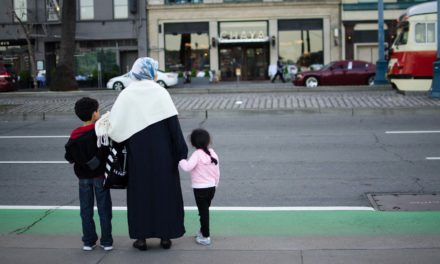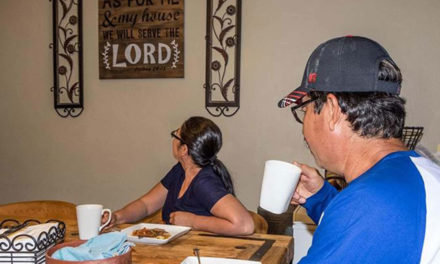There are very few gatherings on the face of the Earth which capture more of the world’s imagination than the annual Hajj pilgrimage to Mecca. Every year, over two million Muslims (out of a staggering 1.7 billion Muslims worldwide) from every country on the planet embark on this once-in-a-lifetime journey to fulfill the fifth foundational pillar of Islam.
Just the aesthetic beauty and power of seeing so many people from every race congregate together in Mecca can be overwhelming. Imagine yourself in a sold-out football stadium with 80,000 people and then multiply that 25 times. In terms of economic impact, the Hajj (and lesser Umrah) pilgrimage generates about $12 billion in revenue for Saudi Arabia.
Sadly, the COVID-19 pandemic has reduced the number of people taking part this week to 1,000 total. The spiritual lessons of the Hajj, however, feel more relevant than ever.
The two million Muslims who participate in a typical year are called to reflect on the story of the prophet Abraham’s wife Hagar, an African woman and the first person to perform many of the Hajj rituals which pilgrims follow today. The perseverance celebrated in those acts is also personified in the stories of Abraham and their son, Ishmael, both of whom sacrificed their own personal feelings to perform selfless acts of sacrifice and obedience.
Today, the COVID-19 epidemic has forced Muslims (and practicing believers of other faiths) all over the world to reassess how we might fulfill our spiritual commitments and religious obligations in these unprecedented circumstances. Just a few months ago, during our holy month of Ramadan, the global Muslim community was forced to figure out how to navigate fasting for 30 days without praying inside our mosques or visiting our families. Many of us resorted to holding “Zoom iftars” every night to break our fast while chatting with our friends and families.
“It is the dream of every Muslim believer to visit Mecca and do the Hajj,” a 61-year-old Lebanese pilgrim told The New York Times. “But the pandemic came with no warning and took away that dream.” Many Muslims save up their entire life savings to perform the Hajj pilgrimage once before they die, since it can cost upwards of $10,000 for one person to travel the entire path. As a cultural touchstone, the successful completion of the Hajj conveys such religious status for some people that many Muslims either add the honorary term “Hajji” before their first names on their business cards or add the term “El Hajj” before their names (Malcolm X changed his name to “El Hajj Malik El Shabazz” after his Hajj pilgrimage to Mecca).
“The Hajj is a transformative, emotional, and spiritually moving experience — the spiritual pinnacle of a devout Muslim’s life,” according to Yasir Qadhi, dean of the Islamic Seminary of America.
Yet as we acknowledge the personal sacrifice made by Muslims who may have foregone plans to make the pilgrimage this year, we also remember that every religious tradition teaches the Golden Rule principle of loving thy God and loving thy neighbor.
The importance of that sacrifice has been amply demonstrated. According to The New York Times, a huge gathering of 16,000 people at a Malaysian mosque became the pandemic’s largest known vector in Southeast Asia, spreading the coronavirus to half a dozen countries. Another large religious congregation — this time in New Delhi, India — caused the largest documented spike in COVID-19 cases in India (with nearly one-third of the country’s early cases potentially linked to this event).
The Hajj also feels especially poignant for reasons beyond the pandemic. One of the things that struck me when I performed the pilgrimage in 2000, when I was 23 years old, was what Malcolm X wrote about in his famous “Letter from Mecca:”
There were tens of thousands of pilgrims, from all over the world. They were of all colors, from blue-eyed blondes to black-skinned Africans. But we were all participating in the same ritual, displaying a spirit of unity and brotherhood that my experiences in America had led me to believe never could exist between the white and non-white.
At the same time that Black Lives Matter protests have swept the United States, the pandemic has bolstered Islamophobia around the world. In India, some right-wing ethno-nationalists have labeled COVID-19 the #CoronaJihad on social media to fuel conspiracy theories about Muslims trying to infect and poison Hindus. The Guardian reported that “Muslims have now seen their businesses across India boycotted, volunteers distributing rations called ‘coronavirus terrorists’, and others accused of spitting in food and infecting water supplies with the virus. Posters have appeared barring Muslims from entering certain neighborhoods” across India as well.
In the United Kingdom, counterterrorism police have been “investigating far-right groups accused of trying to use the coronavirus crisis to stoke anti-Muslim sentiment,” according to British journalist Mehdi Hasan. There have also been numerous examples of British Muslims being harassed or attacked, including a hijab-wearing Muslim woman in south London who said she was approached by a man who “got in her face” to cough at her and claimed he had the coronavirus while also hurling racial abuse at her.
For people of faith during this new age of coronavirus, it becomes our respective ethical duties to sacrifice our own personal comforts to ensure that our collective crises can be addressed. Although we cannot marvel at a sea of humanity walking in circles around the symbolic house of God, we should take this opportunity of global reflection to devote ourselves to greater unity and social justice.














